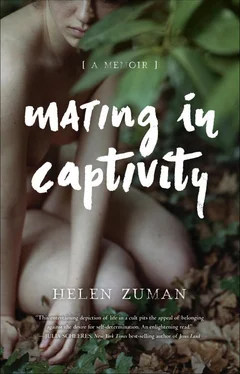After working for about an hour, I heard Andy take a phone call in an adjoining room. “Yes, this is Mr. Levin’s assistant.” Pause. “I’m getting the Deep Gap house cleared out for him right now. I fly back to Miami tomorrow.”
I bent low over the seam I was taping, to hide the deep flush heating my cheeks. No wonder this house is so huge! We are working—for free!—for the asshole who’s wrecking our home.
I wasn’t the only one who’d overheard Andy’s conversation. When I straightened up, Leah was squinting at me in livid disbelief.
“Did you hear that?” I whispered.
She nodded.
“What the fuck?”
She shook her head.
“Arol must have misunderstood.”
“Yeah,” she said. “We’ll tell her at lunch.”
By the time Zar honked from the driveway, we all knew whose stuff we were packing up. The guys didn’t care, but we girls were furious. Back at the Farm, we charged up to the Addition.
Arol, sipping tea at her kitchen table, nodded as we spilled our tale of insult. I kept expecting shock, anger, indignation to fracture her composure. But her gaze stayed calm, her grip firm on her cup. When we finished, she said, “I’ll talk to Zar about it.”
After lunch, the men returned to Deep Gap. I could not work out how this served Zendik. Arol—typically adept at stitching rips in her scrim of plausibility—had bewildered me.
Maybe she was too consumed by the move to give her weave the care it needed.
And maybe I, torn from hope for “Love” with a capital “L,” felt less compelled to mend the rips myself.
My final flame at the Farm blazed just six weeks.
Adam, like Amory, had escaped the Army by purposely failing a drug test. Then, on the G.I. Bill, he’d majored in women’s studies at a historically female college—which he’d quit, in late 2003, to move to Zendik. In my eyes, he was both sensitive new age guy and sexy ex-spy; I loved the hint of machismo in his voice when, echoing his Mexican father, he sweetly called me chica .
We started dating in late June 2004. In mid-July, when Arol announced her plan to buy the ranch in West Virginia, she cast the move as an ordeal that would break the weak. Then she zeroed in on Adam—the newest Zendik. Would he make it?
Yes, he said. He’d stick with the mission.
I wanted to trust him.
But what if he was weak? What if his weakness infected me, sucked me into disloyalty?
In early August, I heard he’d made only two hundred–something at a Projekt Revolution concert where the rest of his crew had averaged five. Uh-oh. Sure, he was new—but if he’d been with them he would have caught their wave and surfed it to breakthrough.
A few days later, my all-girl crew stopped over in West Virginia, en route to Vermont to sell what was being billed as the last Phish show ever. The guy sellers, between concert trips, would stop over as well. Arol was in North Carolina with everyone else.
The new Farm stretched vast and flat, against a swell of blue hills. The stone-rimmed pond, crowned with a fountain that lit up at night, outclassed the muddy hole Zar had gouged with his borrowed claw. Indoors, floods of sunlight poured into the open kitchen and adjoining dining room through a bank of floor-to-ceiling windows. The mansion’s past as a comfortable home for one family teased me with hope for harmony, while its emptiness pledged a fresh start.
All of this offered but a moment’s distraction from my anguish over Adam.
The morning the men arrived, I asked Noi, their leader, for a report on Adam’s performance. He confirmed that Adam had been “a drag” on the trip they’d just completed. We agreed to call a meeting.
Around noon, both crews gathered in the sun-drenched dining room, our backs to the view. I did not sit by Adam.
Noi started off with an accusing confession: “On this last trip, I caught myself thinking I didn’t want Adam to have food , he was giving so little to our crew.” He blinked in shock at the cruelty of his thought. A couple of the other men nodded. “Maybe I went there in my mind because he doesn’t want to be here.”
The men nodded again. Noi turned to Adam and popped the question every Zendik dreaded: “Do you want to go out?”
Eyes on the floor, Adam rubbed his palms against his kneecaps. His forehead shone with sweat. “I… I… I mean, no, I don’t. But I thought… I thought maybe I’d go hiking in the forest here for a week or two. Take some time to get my head straight.”
I’d made a similar plea years earlier, in Chicago, hoping to sidestep Cayta’s demand that I sell or take the bus home. By now I knew better than to request—or endorse—breaks to reflect. And I knew we couldn’t have one of our number roaming the woods, smudged and confused, shedding shadows on Zendik. A dozen heads, mine among them, wagged in censure.
Taridon, battle-ready in leather chaps, flashed Adam a scorching glance. “Look, man, don’t fuck around. You’re in or you’re out. That’s it.”
Adam broke. His face crumpled, as if Taridon had triggered controlled demolition. “I think I want to go,” he said, tears wetting his cheeks.
The next morning he left for California, armed with his thumb and Zendik’s shove-off: $21 plus a lift to Bluefield and passage to Knoxville by bus.
His leaving lightened him, which made it seem right—even as it cast me into a romantic wasteland: the remaining Zendik men were attached, unattracted, or unattractive, and our flight to the hinterlands had all but stanched the flow of new blood.
Would I ever enjoy sex again? Revel in touch?
A week later, Arol summoned the girl and guy sellers back to West Virginia—this time for an audience with her.
From an armchair commanding the living room, she addressed the dozen of us looking up to her from a half ring on the rug.
“I want you guys to know I’m sick of being treated like an authority figure. It’s not who I am. It’s not fair to me.” Her flaming gaze swept our faces in a merciless arc. “It has to stop.”
I nodded. We nodded. I searched my past for times when my peers and I, or I alone, had forced power on Arol.
No stories leaped forth to back her charge.
She pressed on.
“It’s gonna be a big change, all of us under one roof. I’m gonna be seeing a lot more of you guys day-to-day, and I’m gonna be saying what I see in the moment, same as I always have with whoever’s in close.”
The house had four bedrooms and three baths. Arol and her intimates would sleep in beds in the second-floor master suite, which included a bathroom, while the rest of us would roll out quilts and sleeping bags each night in the living room and the other three bedrooms (all on the ground floor) and share the other two baths. Descending the stairs in the morning, Arol would enter the mesh of common spaces—kitchen, living room, dining room—at the heart of the new Farm. As in North Carolina, every season would be open season—but here, she’d have the whole herd at close range.
She leaned forward, knees propping her elbows. “I’m not sure everybody’s ready for that kind of intensity. So I’m looking at renting a house in town for whoever can’t handle it.” She squinted at us, as if scanning for aura shifts. “What do you think? Do you want me to do that?”
I suspect that if anyone had said yes, she would have waited a day or two, then shamed the fainthearted off the Farm.
I, for one, was ready. I imagined the coming hail of input as a hard but bracing rain speeding my purification. And I dreamed that uniting under one roof would free us from the hierarchy haunting the hardscape of the Farm in North Carolina—that the quake of the move would level us, where snipping our wristbands had failed.
Читать дальше











